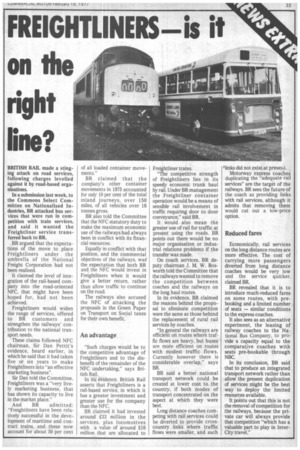FREIGHTLINERS is it on the right line?
Page 35

If you've noticed an error in this article please click here to report it so we can fix it.
BRITISH RAIL made a stinging attack on road services, following charges levelled against it by road-based organisations.
In a submission last week, to the Commons Select Committee on Nationalised Industries, BR attacked bus services that were run in competition with train services, and said it wanted the Freightliner service transferred back to BR.
BR argued that the expectations of the move to place Freightliners under the umbrella of the National Freight Corporation had not been realised.
It claimed the level of integration of the rail-based company into the road-oriented NFC, that might have been hoped for, had not been achieved.
Freightliners would widen the range of services, offered to BR customers and strengthen the railways' contribution to the national transport needs.
These claims followed NFC chairman, Sir Dan Pettit's evidence, heard earlier, in which he said that it had taken five or six years to make Freightliners into "an effective marketing business".
Sir Dan told the Committee, Freightliners was a "very lively marketing business, that has shown its capacity to live in the market place."
And BR admitted: "Freightliners have been relatively successful in the development of maritime and contract trains, and these now account for about 50 per cent of all loaded container movements."
BR claimed that the company's other container movements in 1975 accounted for only 10 per cent of the total inland journeys, over 150 miles, of all vehicles over 16 tonnes gross.
BR also told the Committee that the NFC statutory duty to make the maximum economic use of the railways had always been in conflict with its financial resources.
Equally in conflict with that position, and the commercial objectives of the railways, wa the expectation that both BR and the NFC would invest in Freightliners when it would give a better return, rather than allow traffic to continue on the road.
The railways also accused the NFC of attacking the proposals in the Green Paper on Transport on Social taxes for their own benefit.
An advantage
"Such charges would be to the competitive advantage of Freightliners and to the disbenefit of the remainder of the NFC undertaking," says British Rail.
In its evidence, British Rail asserts that Freightliners is a rail-based service, in which it has a greater investment and greater use for the company than the NFC.
BR claimed it had invested around £33 million in the services, plus locomotives with a value of around £10 million that are allocated to Freightliner trains.
"The competitive strength of Freightliners lies in its speedy economic trunk haul by rail. Under BR management the Freightliner container operation would be a means of sensible rail involvement in traffic requiring door to door conveyance," said BR.
It would also mean the greater use of rail for traffic at present using the roads. BR points out there would be no major organisation or industrial relations problems if the transfer was made.
On coach services, BR deputy chairman J. M. W. Bosworth told the Committee that the railways wanted to remove the competition between coaches and the railways on the long haul routes.
In its evidence, BR claimed the reasons behind the proposal to eliminate competition were the same as those behind the replacement of rural rail services by coaches.
"In general the railways are efficient on routes where traffic flows are heavy, but buses are more efficient on routes with modest traffic flows. Currently however there is considerable overlap," says BR.
BR said a better national transport network could be created at lower cost to the country, if both modes of transport concentrated on the aspect at which they were best.
Long distance coaches competing with rail services could be diverted to provide crosscountry links where traffic flows were smaller, and such 'links did not exist at preseht. Motorway express coaches duplicating the "adequate rail services" are the target of the railways. BR sees the future of the coach as providing links with rail services, although it admits that removing them would cut out a low-price option.
Reduced fares
Economically, rail services on the long distance routes are more effective. The cost of carrying more passengers diverted from long distance coaches would be very low and the service quicker, claimed BR.
BR revealed that it is to introduce much-reduced fares on some routes, with prebooking and a limited number of seats — similar conditions to the express coaches.
It also sees as an alternative experiment, the leasing of railway coaches to the National Bus Company, to provide a capacity equal to the comparative coaches with seats pre-bookable through NBC.
In its conclusion, BR said that to produce an integrated transport network rather than allow the present duplication of services might be the best way to deploy the limited resources available.
It points out that this is not the removal of competition for the railways, because the private car will always provide that competition "which has a valuable part to play in InterCity travel."








































































































